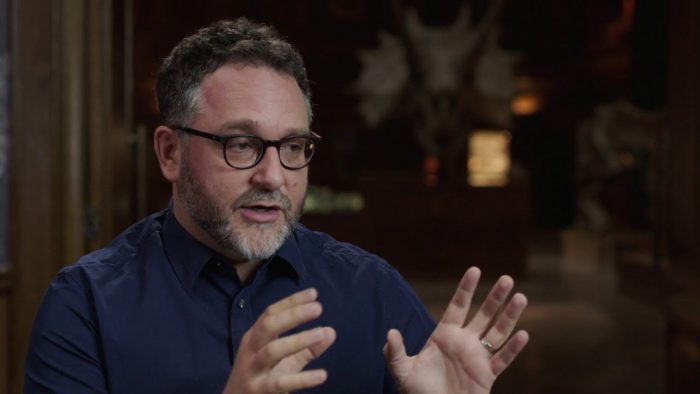Exclusive: Colin Trevorrow Explains The 'Jurassic World: Fallen Kingdom' Ending, Teases Where 'Jurassic World 3' Will Go
A couple weeks ago, I met up with co-writer and producer Colin Trevorrow in an empty hotel lobby to talk about Jurassic World: Fallen Kingdom. I had planned a traditional interview, but it being the night after the film's Hollywood premiere, Trevorrow seemed excited to finally dive into spoilers. So my interview plans took a sharp right turn and I threw out most of my non-spoiler questions.
In our conversation, Trevorrow explains the very ambitious ending of this film, the movie's big twist, offers multiple teases as to what we might expect from Jurassic World 3, and much more. I have one bit of the interview that I will hold off for tomorrow, but the rest is here for your enjoyment. And, of course, major spoilers lie ahead.
Colin Trevorrow Jurassic World Fallen Kingdom Interview
Peter Sciretta: Let's start at the beginning.Colin Trevorrow: Okay. Peter: When did the idea behind this film come about? Colin: Well, we had a beginning, a middle and an end. And we knew the end of the middle. The end of this movie...is this a spoilercast or not? Do we talk about it?Peter: We can do that.Colin: Whatever you think?Peter: Yeah, let's do it.Colin: Okay, cool. We knew that we wanted to structurally to bring this into like a just a tight, constricted, claustrophobic funnel of a vice and then let it all explode and open up really wide. And we also knew that we wanted to take the idea of not just a cloned dinosaur, but the emotional needs that would go into realizing that you are of another time and of another place and are displaced and struggling with that identity. And all those things that hopefully we get to think about in the future. And just the idea that these dinosaurs are animals. And that they have rights and that there's a question as to whether they deserve to live, whether we have a responsibility to them. All those ideas we felt were the right place to go in the middle. 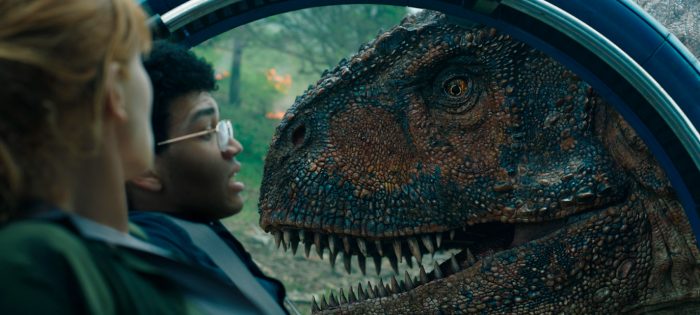 Peter: It's interesting because, for this franchise, we didn't really start caring about the dinosaurs until your films, I think. A little bit in the first one and this one a lot. Colin: Right.Peter: Traditionally they've been just monsters. Now we're the kind of the monsters.Colin: I mean, like I half agree. Like I feel like as fans we cared about them. And I think I just I took that love and just transferred it into the story. 'Cause I, we love the T. Rex and we love those Raptors, even though we know they'll bite your head off and it felt like it's a natural progression to apply that fan love to the characters and to the world. I also think that no franchise can continue or garner anyone's interest unless it's a character-based franchise. Unless you actually care about what's gonna happen to those people from one movie to the next. Jurassic had never really had that. It wasn't the way that it was built. You would take one lead from a previous film and put them in the next film and get them into a bad situation and they would run away. And I knew that there's no way that we could do three movies of that again. The audience would abandon us. And so we turned it into a character franchise with humans and dinosaurs.
Peter: It's interesting because, for this franchise, we didn't really start caring about the dinosaurs until your films, I think. A little bit in the first one and this one a lot. Colin: Right.Peter: Traditionally they've been just monsters. Now we're the kind of the monsters.Colin: I mean, like I half agree. Like I feel like as fans we cared about them. And I think I just I took that love and just transferred it into the story. 'Cause I, we love the T. Rex and we love those Raptors, even though we know they'll bite your head off and it felt like it's a natural progression to apply that fan love to the characters and to the world. I also think that no franchise can continue or garner anyone's interest unless it's a character-based franchise. Unless you actually care about what's gonna happen to those people from one movie to the next. Jurassic had never really had that. It wasn't the way that it was built. You would take one lead from a previous film and put them in the next film and get them into a bad situation and they would run away. And I knew that there's no way that we could do three movies of that again. The audience would abandon us. And so we turned it into a character franchise with humans and dinosaurs. 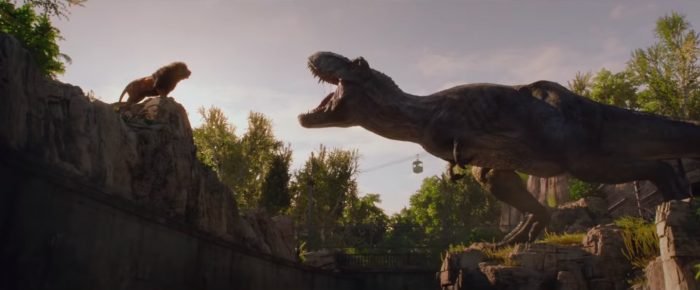 Peter: So when you initially went in to pitch to Frank and Steven for the first one, did you have this whole idea for this trilogy arc? Colin: No. I made no presumptions at that point. That I was focused on just how we would reintroduce it to a new generation and how we would rebuild something without replicating it completely and that was the focus there. Once we made the film and we got to start asking the question of whether anyone would ever wanna see another, which I would never assume, we really started talking about it. And I actually, I'm one of those people who feels like there could have just been one Jurassic Park. And I spend most of my waking hours trying to convince myself that that's not true. That we deserve not as creatives, but that this story deserves to be told on this scale. And I managed to convince myself. I drunk my own Kool-Aid.
Peter: So when you initially went in to pitch to Frank and Steven for the first one, did you have this whole idea for this trilogy arc? Colin: No. I made no presumptions at that point. That I was focused on just how we would reintroduce it to a new generation and how we would rebuild something without replicating it completely and that was the focus there. Once we made the film and we got to start asking the question of whether anyone would ever wanna see another, which I would never assume, we really started talking about it. And I actually, I'm one of those people who feels like there could have just been one Jurassic Park. And I spend most of my waking hours trying to convince myself that that's not true. That we deserve not as creatives, but that this story deserves to be told on this scale. And I managed to convince myself. I drunk my own Kool-Aid.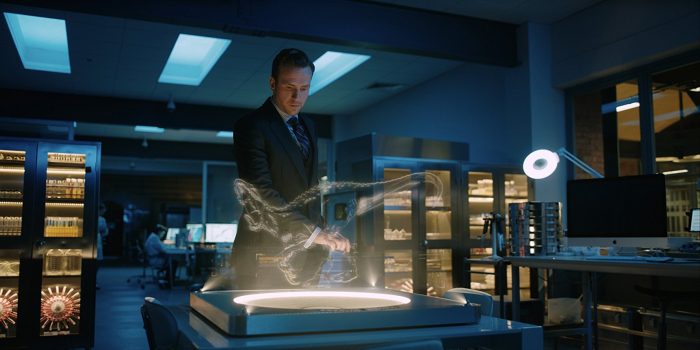 Peter: Well I think that's something that's interesting about your films. I think people write them off as another mindless big blockbuster, but they are about something. The first film's even about corporations and making a sequel even when it's not necessarily a good idea.Colin: Yeah. It's funny, I observed that too, that people are certainly identifying a thread of anti-authoritarianism in my stories. The first one is a pretty anti-corporate film while being funded by a giant corporation. And about a very corporate character breaking out of that construct and embracing nature and the second film is clearly about animal rights. And the effect that we're having on the environment. And the ecology of the planet. I was raised by Hippies in San Francisco and Oakland. Like, this is who I am. And it's just sort of, I think because I make these giant blockbusters people kind of assume that I am one way. But I wrote this shit out of Vermont, man. Like I live on a farm. Like I'm not trying to burn it down. But I think it's a responsibility to put some of these ideas in these films. They reach so many people.
Peter: Well I think that's something that's interesting about your films. I think people write them off as another mindless big blockbuster, but they are about something. The first film's even about corporations and making a sequel even when it's not necessarily a good idea.Colin: Yeah. It's funny, I observed that too, that people are certainly identifying a thread of anti-authoritarianism in my stories. The first one is a pretty anti-corporate film while being funded by a giant corporation. And about a very corporate character breaking out of that construct and embracing nature and the second film is clearly about animal rights. And the effect that we're having on the environment. And the ecology of the planet. I was raised by Hippies in San Francisco and Oakland. Like, this is who I am. And it's just sort of, I think because I make these giant blockbusters people kind of assume that I am one way. But I wrote this shit out of Vermont, man. Like I live on a farm. Like I'm not trying to burn it down. But I think it's a responsibility to put some of these ideas in these films. They reach so many people.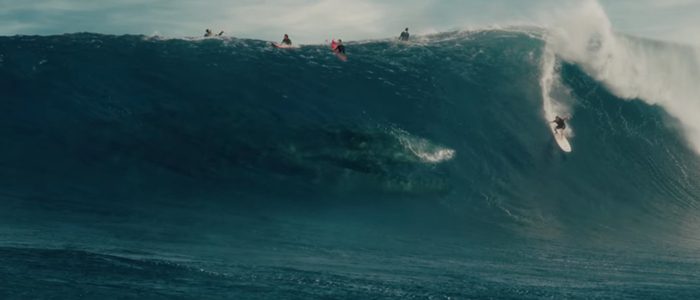 Peter: On set Frank mentioned that originally you wanted to take this film much further into the story that you had plotted out.Colin: Yeah. I mean, the ending was the same. It was that we wanted to cycle further forward into the integration of the animals into the world. I think 'cause we were so excited. And what we found is that by doing that it sort of defused this story that we were telling. And if it was really gonna be effective, we had to show that restraint. So much of writing is restraint. And just recognizing that if we just blow it all out and lay it all on the screen, we're gonna have nowhere left to go. So that's why when Derek and I talked about the second movie, we talked about the second and the third and there were so many ideas 'cause all writers know that it's too many ideas is usually the problem. It's never not enough. And so making sure that we were just judicious and thoughtful and made a singular experience specifically designed for Bayona, that that would work.
Peter: On set Frank mentioned that originally you wanted to take this film much further into the story that you had plotted out.Colin: Yeah. I mean, the ending was the same. It was that we wanted to cycle further forward into the integration of the animals into the world. I think 'cause we were so excited. And what we found is that by doing that it sort of defused this story that we were telling. And if it was really gonna be effective, we had to show that restraint. So much of writing is restraint. And just recognizing that if we just blow it all out and lay it all on the screen, we're gonna have nowhere left to go. So that's why when Derek and I talked about the second movie, we talked about the second and the third and there were so many ideas 'cause all writers know that it's too many ideas is usually the problem. It's never not enough. And so making sure that we were just judicious and thoughtful and made a singular experience specifically designed for Bayona, that that would work. 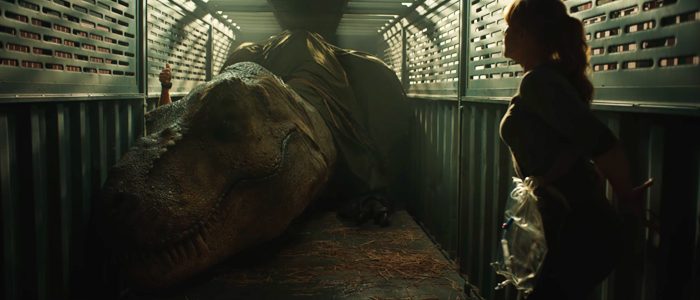 Peter: This film takes things in a very different direction. Is there any concern that maybe audiences might not like where you're headed?Colin: Every day. Of course. I mean, I have to be concerned about that. Because I'm so hyper-aware of the emotional resonance and value placed in the main character that we're killing in this movie. We burn down the island. And we treat that in a way that we would any other major character that we love. It's like the burning of a church or a temple when it happens. And we understand all of the risks inherent in that, but we also know that we have to move forward in a way that feels organic to the story that everybody loves. And I hope that people embrace it and understand what we're doing and are able to go with us. But that's really so much what this kind of storytelling is. When you're making a new version of something that people love, you're just kind of holding out your hand and saying, like come with me across this bridge. Are you willing to come with me? And hope that they'll walk.
Peter: This film takes things in a very different direction. Is there any concern that maybe audiences might not like where you're headed?Colin: Every day. Of course. I mean, I have to be concerned about that. Because I'm so hyper-aware of the emotional resonance and value placed in the main character that we're killing in this movie. We burn down the island. And we treat that in a way that we would any other major character that we love. It's like the burning of a church or a temple when it happens. And we understand all of the risks inherent in that, but we also know that we have to move forward in a way that feels organic to the story that everybody loves. And I hope that people embrace it and understand what we're doing and are able to go with us. But that's really so much what this kind of storytelling is. When you're making a new version of something that people love, you're just kind of holding out your hand and saying, like come with me across this bridge. Are you willing to come with me? And hope that they'll walk. 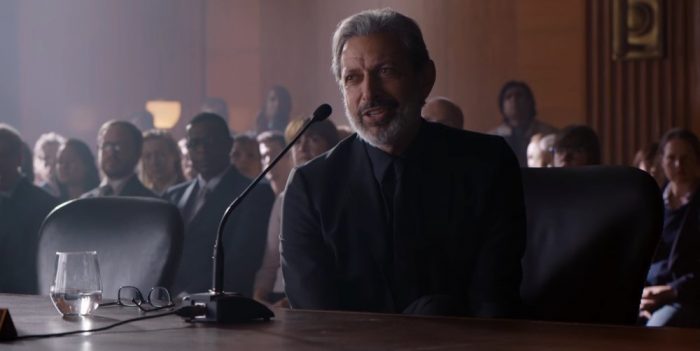 Peter: You were talking about the ending before and I do really like this film, but I'm a little confused by the ending and I'm wondering if you can clarify it. There seems to be a big disparity from what Jeff Goldblum's character Malcolm is trying to say. He's painting this grand vision of there being tons of dinosaurs out there, but it seems to me that there's only like a dozen or two dozen dinosaurs and they'd be easy to just like send the National Guard out and capture or kill them.Colin: Well, but there's also all the DNA that went out. I mean, maybe it's only one shot, but there's a shot of a briefcase with like 20 different kinds of species in it. That we're all sold off as well. And I think that he's a predictor. And so what he's saying is like he's Al Gore. And he's saying like look, I predicted that this global equilibrium that everybody was so confident would remain exactly the same has clearly not anymore. And we, again, we didn't wanna go too far and we're certainly gonna jump into the future in the next movie a little bit further down the line. But really we felt like that the responsibility of a second film is to make sure that at the very end, everything is changed and nothing will ever be the same. And that's where we leave it. Peter: That's interesting. Because I don't know what that third film is. Because I feel like it's court hearings...?Colin: Well it's not, I don't see it as being a domestically, it's not a localized story 'cause they're going all over the world. And I feel like the ability, there's a line in the first movie, which I think we left in the movie, where he says, we won't always be the only ones who can make a dinosaur. And in this one he's saying, they're gonna make more. And the idea that InGen, that this one guy, that Doctor Wu is the only person who knows how to do this after 30 years of this technology existing starts to strain credibility for me. There's Mac, there's PC, people learn technology, nuclear power he mentions the beginning. At first it was the U.S. and now what is it, 15 countries that can do it? It's only been 50 years.
Peter: You were talking about the ending before and I do really like this film, but I'm a little confused by the ending and I'm wondering if you can clarify it. There seems to be a big disparity from what Jeff Goldblum's character Malcolm is trying to say. He's painting this grand vision of there being tons of dinosaurs out there, but it seems to me that there's only like a dozen or two dozen dinosaurs and they'd be easy to just like send the National Guard out and capture or kill them.Colin: Well, but there's also all the DNA that went out. I mean, maybe it's only one shot, but there's a shot of a briefcase with like 20 different kinds of species in it. That we're all sold off as well. And I think that he's a predictor. And so what he's saying is like he's Al Gore. And he's saying like look, I predicted that this global equilibrium that everybody was so confident would remain exactly the same has clearly not anymore. And we, again, we didn't wanna go too far and we're certainly gonna jump into the future in the next movie a little bit further down the line. But really we felt like that the responsibility of a second film is to make sure that at the very end, everything is changed and nothing will ever be the same. And that's where we leave it. Peter: That's interesting. Because I don't know what that third film is. Because I feel like it's court hearings...?Colin: Well it's not, I don't see it as being a domestically, it's not a localized story 'cause they're going all over the world. And I feel like the ability, there's a line in the first movie, which I think we left in the movie, where he says, we won't always be the only ones who can make a dinosaur. And in this one he's saying, they're gonna make more. And the idea that InGen, that this one guy, that Doctor Wu is the only person who knows how to do this after 30 years of this technology existing starts to strain credibility for me. There's Mac, there's PC, people learn technology, nuclear power he mentions the beginning. At first it was the U.S. and now what is it, 15 countries that can do it? It's only been 50 years. 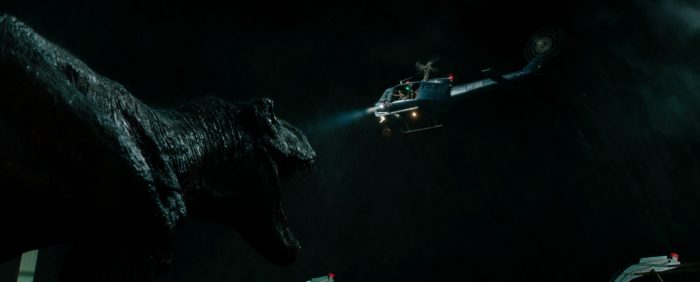 Peter: Let's rewind for a second. The opening sequence is probably the best opening sequence of this franchise. Actually, it is the best opening sequence of the franchise.Colin: Thank you.Peter: And it seems to borrow from earlier Spielberg ideas from earlier films. Or is that not true?Colin: Probably just instinctively. I didn't pull from anything. I knew we were going to completely shift the ground beneath the feet of the franchise over the course of the movie. And so I wanted to construct a sequence that was the ultimate Jurassic Park-like everything. Yellow raincoats and dinosaurs in the rain and like just multiple layers of peril and there's obviously a story point to it. It's not completely random. But that's me and Derek and JA Bayona just working in concert to do the ultimate tribute to everything we love about the franchise before we start to move the franchise in a different direction.
Peter: Let's rewind for a second. The opening sequence is probably the best opening sequence of this franchise. Actually, it is the best opening sequence of the franchise.Colin: Thank you.Peter: And it seems to borrow from earlier Spielberg ideas from earlier films. Or is that not true?Colin: Probably just instinctively. I didn't pull from anything. I knew we were going to completely shift the ground beneath the feet of the franchise over the course of the movie. And so I wanted to construct a sequence that was the ultimate Jurassic Park-like everything. Yellow raincoats and dinosaurs in the rain and like just multiple layers of peril and there's obviously a story point to it. It's not completely random. But that's me and Derek and JA Bayona just working in concert to do the ultimate tribute to everything we love about the franchise before we start to move the franchise in a different direction.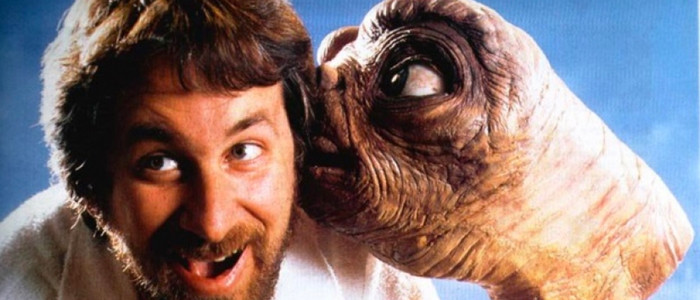 Peter: And you mentioned at the premiere last night that Spielberg would be giddy seeing the concept art that JA was producing? Can you talk about that a little bit?Colin: There's just an energy that erupts in him when he sees something new. And look, as you're saying before like what we're doing here is new. And some people might like it. Some people might not. But the ideas in the film, the identity of the girl, the way that we take it, the question that we're asking and then also just the visuals that Bayona was able to bring up, he would just get fired up about it 'cause he's a creative person and way deep down he just wants to be entertained. Peter: Well it seems like the idea of weaponized dinosaurs and genetically modified things came from ideas Spielberg was working on with that original 4 draft. How much did that influence where you...?Colin: That's definitely, that vein of it is Steven's vein. In all of this storytelling and so our relationship when it comes to that has been about me listening and trusting that Steven has had a million amazing ideas over time and tried to find a way to present it and translate it to the world visually and from a story standpoint in a way that I feel is grounded in the way that we're telling the rest of the story. For example, in the first film as opposed to having you can militarized Raptors in two ways. You can have them jump out of a helicopter with parachutes and take out a drug dealer. Which was in one early script. Or you can dial that all the way back to the very first moment that someone realized that they might follow an order. That's what we did. And so in this film similarly just kind of dialling it back to a place that feels like it could exist in our world. And we are not, I don't wanna say jumping the shark. That feels like too direct a reference.
Peter: And you mentioned at the premiere last night that Spielberg would be giddy seeing the concept art that JA was producing? Can you talk about that a little bit?Colin: There's just an energy that erupts in him when he sees something new. And look, as you're saying before like what we're doing here is new. And some people might like it. Some people might not. But the ideas in the film, the identity of the girl, the way that we take it, the question that we're asking and then also just the visuals that Bayona was able to bring up, he would just get fired up about it 'cause he's a creative person and way deep down he just wants to be entertained. Peter: Well it seems like the idea of weaponized dinosaurs and genetically modified things came from ideas Spielberg was working on with that original 4 draft. How much did that influence where you...?Colin: That's definitely, that vein of it is Steven's vein. In all of this storytelling and so our relationship when it comes to that has been about me listening and trusting that Steven has had a million amazing ideas over time and tried to find a way to present it and translate it to the world visually and from a story standpoint in a way that I feel is grounded in the way that we're telling the rest of the story. For example, in the first film as opposed to having you can militarized Raptors in two ways. You can have them jump out of a helicopter with parachutes and take out a drug dealer. Which was in one early script. Or you can dial that all the way back to the very first moment that someone realized that they might follow an order. That's what we did. And so in this film similarly just kind of dialling it back to a place that feels like it could exist in our world. And we are not, I don't wanna say jumping the shark. That feels like too direct a reference. 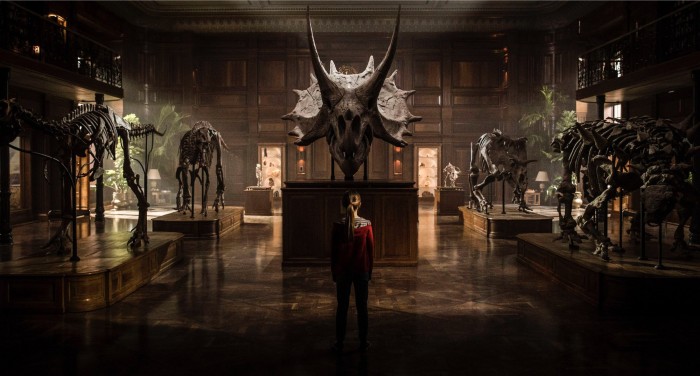 Peter: Yeah. Could you talk a little bit about Maisie and the reveal in this film? Because it's very interesting and I didn't see it coming. Colin: I am so like my I'm so worried that it's too telegraphed over the course of the movie. Like that balance–Peter: I didn't even get it when I saw the first photo.Colin: Oh cool. But you get it when you find out, well that's what we've, that scene at the end is just to make sure that people who hadn't gotten it, 'cause it is and it isn't said clearly. But I think when you see how many different moments, that book and the picture and did she look like me? All those moments, it is layered in so that when you finally discover it, it can be a surprise without like making you throw your popcorn out and walk out of the theater. I get super fired up about giant turns like that. I think it's clear by now. Like I just, I really do. Like I think that audiences are in this moment both culturally in America where we are used to things happening every day that are like shocking turns. That we're just becoming desensitized to. And I'm really into reflecting that in storytelling. And this is one of those moments. It wouldn't shock me if something like that were to be revealed. I just heard a couple months ago that Barbara Streisand cloned her dog. We're not that far off.Peter: Does that come out of like we need someone to press that button? Colin: No. It was the other way around. It's that we're gonna have this character and now who would press that button? Out of this group. It wasn't reverse engineered. But it is an impossible decision who would make it? A child. Who is able to see things not in a simple way, but in a very pure that sense of right and wrong that only children have that adults kind of get muddled and mired over time, which is another theme of a lot of films I've made. The simplicity of childhood mortality.
Peter: Yeah. Could you talk a little bit about Maisie and the reveal in this film? Because it's very interesting and I didn't see it coming. Colin: I am so like my I'm so worried that it's too telegraphed over the course of the movie. Like that balance–Peter: I didn't even get it when I saw the first photo.Colin: Oh cool. But you get it when you find out, well that's what we've, that scene at the end is just to make sure that people who hadn't gotten it, 'cause it is and it isn't said clearly. But I think when you see how many different moments, that book and the picture and did she look like me? All those moments, it is layered in so that when you finally discover it, it can be a surprise without like making you throw your popcorn out and walk out of the theater. I get super fired up about giant turns like that. I think it's clear by now. Like I just, I really do. Like I think that audiences are in this moment both culturally in America where we are used to things happening every day that are like shocking turns. That we're just becoming desensitized to. And I'm really into reflecting that in storytelling. And this is one of those moments. It wouldn't shock me if something like that were to be revealed. I just heard a couple months ago that Barbara Streisand cloned her dog. We're not that far off.Peter: Does that come out of like we need someone to press that button? Colin: No. It was the other way around. It's that we're gonna have this character and now who would press that button? Out of this group. It wasn't reverse engineered. But it is an impossible decision who would make it? A child. Who is able to see things not in a simple way, but in a very pure that sense of right and wrong that only children have that adults kind of get muddled and mired over time, which is another theme of a lot of films I've made. The simplicity of childhood mortality.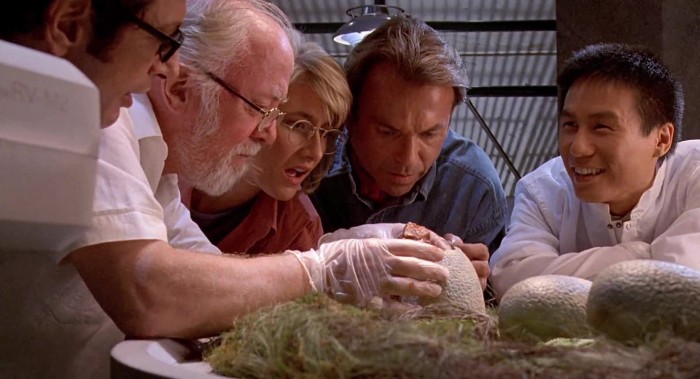 Peter: Yeah. Since you're hinting that the next film might go global or you're not hinting, you said that. Is there a chance that we might need some other characters to come back? Like Grant and Sadler? Colin: There is I am so interested in that I can't tell you. I... With all of these characters, I have such respect for them and I'm very careful. Maybe I've been too cautious if anything. And I brought them back in in ways that have only felt absolutely organic to the story that we're telling. But I do think that we may have earned the opportunity to engage them a little more. That's all I'll say. But yeah, I don't just trot them out to make a buck. I respect them so much. Peter: It would have felt weird if Malcolm was along for this journey.Colin: I wouldn't have bought it.
Peter: Yeah. Since you're hinting that the next film might go global or you're not hinting, you said that. Is there a chance that we might need some other characters to come back? Like Grant and Sadler? Colin: There is I am so interested in that I can't tell you. I... With all of these characters, I have such respect for them and I'm very careful. Maybe I've been too cautious if anything. And I brought them back in in ways that have only felt absolutely organic to the story that we're telling. But I do think that we may have earned the opportunity to engage them a little more. That's all I'll say. But yeah, I don't just trot them out to make a buck. I respect them so much. Peter: It would have felt weird if Malcolm was along for this journey.Colin: I wouldn't have bought it.

